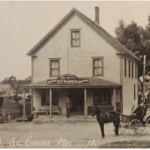China committee gets update from Fiberight
 by Mary Grow
by Mary Grow
China Transfer Station Committee members focused on various forms of recycling at their May 11 meeting, talking about China’s Free for the Taking building; regional hazardous waste disposal and alternatives; and additional recycling possibilities.
They also got an update on plans to reopen the Fiberight disposal facility in Hampden from Michael Carroll, executive director of the Municipal Review Committee (MRC). MRC consists of representatives from Maine municipalities that contracted to bring waste to the Fiberight facility, which closed a year ago. The committee owns the land on which the facility stands, has contracted to supply waste and is named on the waste permit, Carroll said.
The building in which Fiberight intended to process waste, until the company ran out of funds, is owned by bond-holders, Carroll said. Fiberight did the “configuring and dial-setting” for the process that separates and reuses recyclables; the components are off the shelf and can be used and replaced as needed by a successor.
MRC plans to have Pennsylvania-based Delta Thermo Energy (DTE) reopen the plant. Restart date remains undetermined. Meanwhile, most of China’s mixed waste is being landfilled in Norridgewock, to the dismay of local environmentalists.
China Committee Chairman Larry Sikora questioned whether DTE was the best buyer for the closed plant.
Carroll said the MRC didn’t have a choice: two other potentially interested parties dropped out. To Sikora’s questions about how thoroughly DTE had been vetted. Carroll replied, “We did our due diligence.”
DTE has experience with other waste facilities, has more capital than Fiberight started with, is inheriting a building and equipment and when the transfer is final will get rights and operating manuals from the bondholders. The company’s lack of experience with the Fiberight process is not a unique problem, Carroll said, because the process is new; no one has experience with it.
Fiberight “has kind of disappeared on us,” he added. The MRC has been “keeping boots on the ground” to maintain the facility.
Proposed changes in the contract between the plant operator and MRC include giving DTE the option to buy the land, which Carroll said the company is unlikely to exercise for at least two years; and “resetting the clock” so the building lease and the waste supply agreement, now more than a year old, will start over as 15-year arrangements.
After Carroll zoomed out of the meeting, committee members turned to the selectboard’s decision not to participate in the annual hazardous waste disposal day, in Winslow, this year. Winslow charges other towns, and in recent years too few China and Palermo residents have disposed of hazardous waste to justify the cost, selectmen said.
Both the selectmen and the Transfer Station Committee members discussed ways to inform residents about alternative legal disposal places (which probably charge fees), so hazardous wastes will not be combined with mixed waste or dumped into the environment.
Sikora raised the desirability of recycling all batteries, not just big ones. Committee members Ashley Farrington and Karen Hatch think providing separate boxes for small batteries is feasible; they will look into options.
Town Manager Becky Hapgood would like to see the Free for the Taking building reopen in June, but protective measures need to be in place first. She and committee members talked about ways to limit the number of people in and around the building and to limit donations.
Hatch, who manages the building, said sometimes so much is dropped off she can’t get in the door until she rearranges things. She proposed no longer accepting clothing, because, she said, people looking through clothing spend more time inside.
Farrington suggested limiting hours, to provide time to sort items without customers; or charging a deposit that people could get back only by reclaiming items no one else had taken.
Sikora approved Hapgood’s idea that she, Farrington, Hatch and Transfer Station Manager Ronald Marois become a subcommittee to propose procedures.
Farrington has already taken on the project of analyzing information from the Radio Frequency Identification system to detect usage patterns, busy and slack times and other useful factors. Palermo resident Chris Diesch, attending at the invitation of Palermo committee member Robert Kurek, volunteered to help; her offer was accepted with enthusiasm.
The RFID system does not identify users by name. It can record how many times the same person comes in, but not who the person is.
The next regular Transfer Station Committee meeting would have fallen on election day, so members tentatively rescheduled it to 8:30 a.m. Wednesday, June 9.
Responsible journalism is hard work!
It is also expensive!
If you enjoy reading The Town Line and the good news we bring you each week, would you consider a donation to help us continue the work we’re doing?
The Town Line is a 501(c)(3) nonprofit private foundation, and all donations are tax deductible under the Internal Revenue Service code.
To help, please visit our online donation page or mail a check payable to The Town Line, PO Box 89, South China, ME 04358. Your contribution is appreciated!




Last night, Bar Harbor’s Town Council voted 7-0 to request a meeting of the MRC, and to demand answers from MRC’s Executive Director. I hope this will help convince leaders of other member towns d to do the same. Towns must request a meeting of the MRC members no later than June 2. https://theqsjournal.substack.com/p/breaking-news-bar-harbor-council